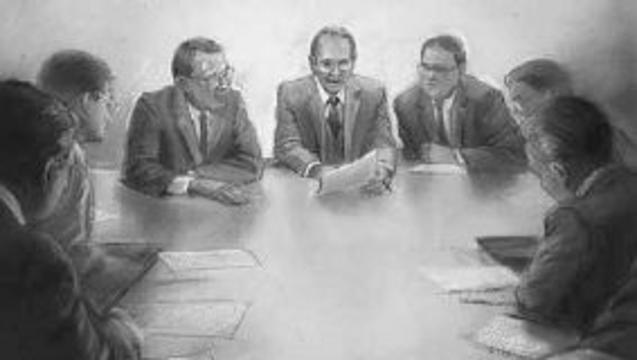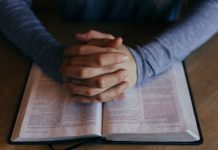
From an early age, I recognized something about me that constantly tormented my thoughts and wounded my heart. Despite being brought up on the belief that I am a “child of God” and that I’m loved, I never felt it. I never felt good enough, never felt that I would succeed spiritually. At one point in my teenage years, I developed the belief that I was inherently evil.
I never showed those emotions and most people thought that I was happy. I vividly remember standing in my grade school hallway watching everyone shuffle to class and thinking, “I never want anyone to feel as alone as I feel.”
So, I put on a smile and started making friends with just about everyone I came to know. Even though I was frequently hurting, I did find some comfort in the scriptures. I was only socially converted to the gospel, and semi-actively went to church with very broken faith.
In my youth, I found some heroes in the scriptures. Naaman was a good man. He was called honorable, a great man, even a mighty man of valor (2 Kings 5:1). He had certainly found favor with the Lord. He was someone I could not only look up to, but someone I felt I related to…because he was a leper.
Now I don’t have leprosy, but we both had something about us that was hopeless and tormenting. It hurt him enough that he sought help from a prophet in another land. What otherwise would have been a fable to him became a hope.
He arrived to receive instruction from the prophet’s servant (not the prophet himself) to bathe in the river Jordan seven times. He was outraged by the situation and by the simplicity of the message, but his own servant reminded him that if he was given some great task he would do it, so why not just “wash, and be clean.”
And here I am, desperate in my prayers, “give me some great thing! I would do some great thing! Keep it simple if you want, but where is my river Jordan?!”
God prepared a miraculous way to heal the Children of Israel when they were bitten by venomous snakes. I imagine Moses standing with a brass serpent on a staff, imploring them, “please just look up and be healed!” but “because of the simpleness of the way, or the easiness of it, there were many who perished (1 Nephi 17:41).
My desperation continued, “God, Please!? Where is my River Jordan? Where is my brazen serpent? God, where is my miracle?” Because of my fears and insecurities, I had learned to lie at an early age. I lied to myself and I kept the truth from others. I figured that what others never knew wouldn’t hurt me. And I often tried to lie to the Lord. It was a desperate act of self-preservation that became a habit, and it was rooted in this frantic plea for change.
And so it went, from junior high into high school, as I learned to study the scriptures. Then it went from high school into the mission field where I applied and taught what I had learned. My desperation grew because the feeling of that inborn plague never ceased. Was I beyond saving? I was always told that no one was beyond the saving power of Christ’s atonement, but how come I couldn’t feel it? I found myself studying, not to teach others but to save my own soul. I was studying for survival.
Post-Mission
 I returned home from the mission field more broken in my faith than when I left, and that wasn’t a good way to start college. I became depressed and suicidal. Then, in my college years, I witnessed a possible miracle. It had all the makings of the river Jordan or the brazen serpent—it only needed to be tested.
I returned home from the mission field more broken in my faith than when I left, and that wasn’t a good way to start college. I became depressed and suicidal. Then, in my college years, I witnessed a possible miracle. It had all the makings of the river Jordan or the brazen serpent—it only needed to be tested.
A friend called me up and said, in frustration, “My bishop told me that If I wanted to overcome my pornography addiction, I should start doing family history work! Isn’t that ridiculous?” A bit jealous and a little frustrated I said, “Yup, almost like bathing in a dirty river seven times or looking at a brass snake on a stick.”
My response wasn’t received very well, but then again, he was looking for justification and not a supporting theory. I was frustrated because he was given an opportunity to prove the Lord. He, who was not worthy to accept any other calling in the Church, was invited to replace a dark habit with a divine service to God and his children. I had one more miracle to add to my desperate list, “God, where is my family history work? Where is my miracle?”
At this point in my life, I may not have reached master scholar when it came to the scriptures, but I knew them. I knew how to study them. I knew how to remember where verses were and how to recall them. I knew how to find what I needed to find, and I had some amazing personal revelations with my studies, but I was still me. I was still stuck. I didn’t know how to truly apply them to myself. My study weakened and eventually stopped.
That question from Moroni 7 nagged at me. “Have miracles ceased?”
Where was my miracle? Where were my angels and my revelations? I did the things that I was supposed to. I served a mission, I had a temple marriage, I started a little family, I even sought professional help, but my torment remained.
And then I gave up. I gave in. I had a faith crisis and I fell away, silently. I was semi-active for years, walking down other paths. After 5 or 6 years of this lonely venture, acting the part of the faithful, but “busy” Mormon, I had to reach out for help, as I was hurting my family and thinking of hurting myself again.
And for the first time, in all honesty, I confessed to those who needed to hear it the most. I found myself in honest, broken faith asking God for strength and forgiveness, family for forgiveness and love, and priesthood leaders for love and guidance. Then finally, for the first time in my life, I felt like I had started to receive my miracle.
Excommunication
 I found myself excommunicated. I found myself almost losing my beautiful wife and family. I found myself at rock bottom. I know it is weird to think of excommunication as a miracle when it is in sharp contrast to Christ recovering the sight of the blind man, casting out illnesses and devils, or even turning water to wine.
I found myself excommunicated. I found myself almost losing my beautiful wife and family. I found myself at rock bottom. I know it is weird to think of excommunication as a miracle when it is in sharp contrast to Christ recovering the sight of the blind man, casting out illnesses and devils, or even turning water to wine.
But the miracle wasn’t being excommunicated, more than it was being honest and penitent. Prior to being excommunicated, I was an Elder in the Church, which isn’t just a title. Being an Elder comes with sacred responsibilities and opportunities and I, like many others, was living below my potential and divine privileges.
I participated in ordinances and blessings unworthily for years, fearing the judgment of others. Because I had “undertaken to cover my sins, or to gratify my pride…in any degree of unrighteousness, behold, the heavens withdrew themselves; the Spirit of the Lord was grieved;” and because it was withdrawn, “amen to the priesthood or the authority” I once had the privilege to hold. Excommunication didn’t separate me from God or take away my authority. I walked away from it years prior.
Excommunication has been a dirty word within the framework of any Church. It has become a taboo topic, where we just don’t talk about it. I myself saw it as justice for sin or apostasy, until I experienced it for myself and discovered that it was more about mercy than it was about justice.
An understanding of the word itself sheds light on it. In Church Latin it means to “expel from communion,” and the Late Latin means to “put out of the community.” Aside from being able to attend services and participate in discussions, I was unable to participate in church as I once had, like partaking of the sacrament, paying tithing, ministering, and doing temple work, among other things, but I was never “put out of the community.”
In fact, my community was more involved and nurturing and the excommunication became a powerful spiritual medicine for my life. If you want to talk about a clean slate, if you want to talk about mercy, this was it. The healing miracle began shortly after that decision was made, as I applied myself to learning the depth of the gospel, as humble and patient as I could be.
Our loving Stake President taught us the doctrine of Christ. I started living the doctrine of Christ. At that very moment when I was pleading for help and forgiveness, I was exercising faith in Christ unto repentance. While excommunicated I wasn’t just waiting around for something to happen, I was anxiously engaged in as much good as I could do, limited only by formal discipline guidelines.
I was more active in the Church as a non-member than I had been in the eleven years after returning home from the mission field. I sought healing with my family. It was not an easy start and I almost didn’t want to get baptized again. For a short time, I didn’t think I would. But the fruit of repentance is baptism and about three or four months into it I was longing to be baptized. I yearned for the constant companionship of the Holy Ghost, and not just visitations.
During this time I made it a conscious effort to come back to Christ and accept him in my life, and the natural consequence of that was being readmitted into the Church, and it was a most wonderful reunion.
The greatest thing that I learned is that asking for and obeying the promptings of the Holy Ghost is a vital aspect of applying the doctrine of Christ in our lives.
And there it is. There is my miracle. I have been waiting for someone to sit me down and say “do this thing and you will change. Wash, and be clean. Look and be healed. Do family history work and overcome addiction.”
If you want a miracle, seek and obey the promptings of the Holy Ghost daily. Take the counsel that Mary gave to her servants at the wedding feast, “whatsoever He saith unto you, do it,” because if you learn how to follow the Spirit in this capacity, faithfully, and without reservation, you will experience a mighty change of heart. You will experience greater miracles than those recorded in the scriptures, because you will start becoming something new, like water to wine.
It wasn’t the river Jordan that healed Naaman and it wasn’t the brazen serpent that healed the Children of Israel. The miracle was fulfilled through their willingness to do what they were told to do by their spiritual leaders. It puts some perspective on the invitation by our prophet to read the Book of Mormon daily, or fast from social media, or the invitation to use the correct name of the Church.
In regard to my torment, my struggle, it’s still there. And maybe this makes me more like Paul, who had a “thorn in the flesh.” He had something to keep him humble. He had something that God could use to make him strong and teach him about His grace. Paul asked for it to be removed several times, but God told him no. So maybe I can accept that answer too, and like Paul, “glory in my infirmities, that the power of Christ may rest upon me.” Maybe I can take the advice of a modern-day apostle when Jeffrey R. Holland said to “cherish your spiritual burdens because God will converse with you through them and will use you to do his work if you carried them well.”
Have I seen a miracle fulfilled in my life? Yes, and it can be summed up in the 36th chapter of Ezekial, verses 25-28:
“…ye shall be clean…from all your filthiness…will I cleanse you. A new heart also will I give you, and a new spirit will I put within you: and I will take away the stony heart out of your flesh, and I will give you an heart of flesh. And I will put my spirit within you, and cause you to walk in my statutes, and ye shall keep my judgments, and do them… and ye shall be my people, and I will be your God.”
I am convinced that a miracle is nothing more than a promise fulfilled. And as we faithfully endure this life, living in a manner to receive guidance from the spirit, we will have the opportunity to overcome the natural man, live the celestial law and see daily miracles as we become better versions of ourselves, as we become like Christ.





